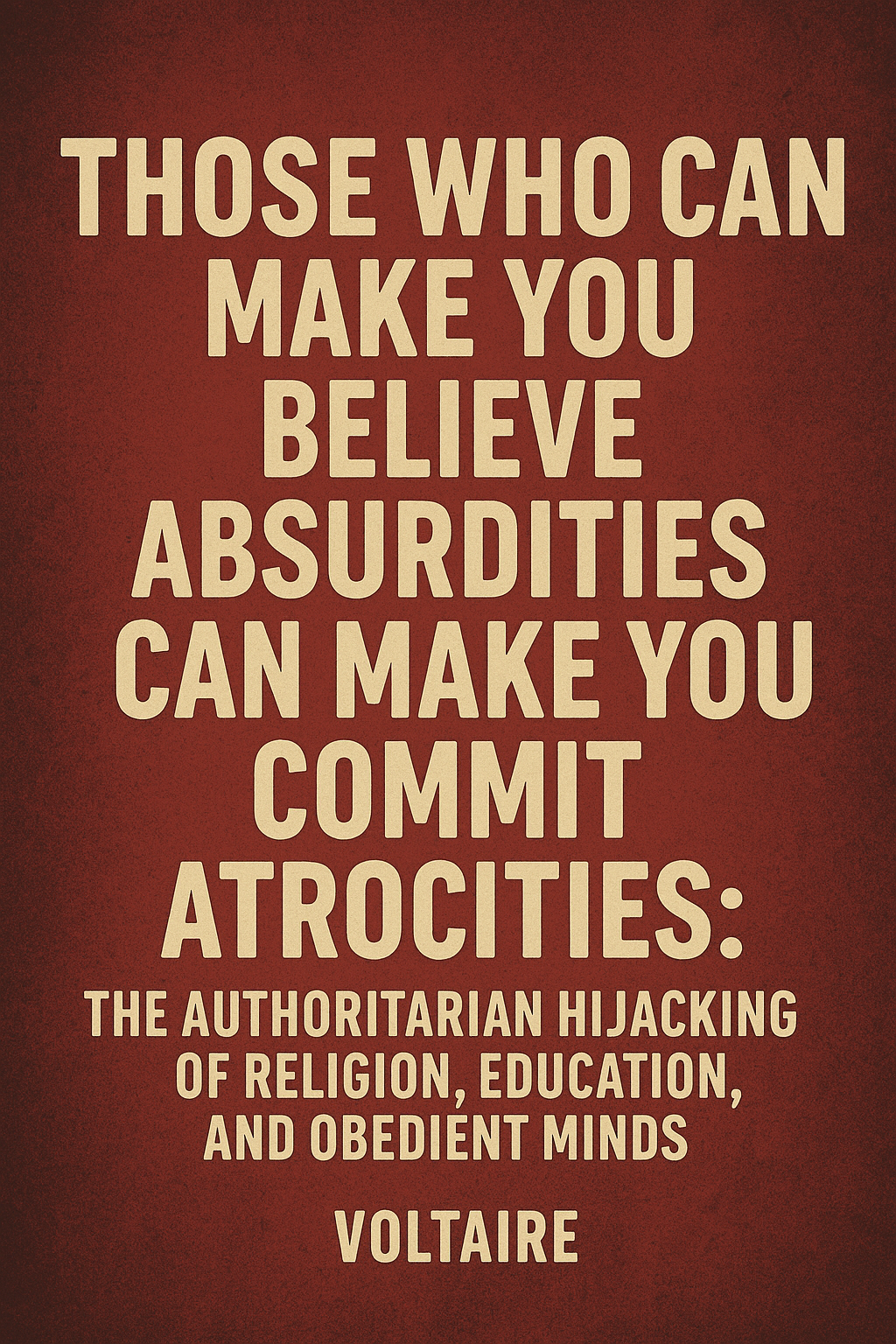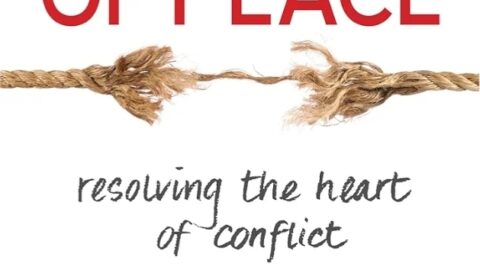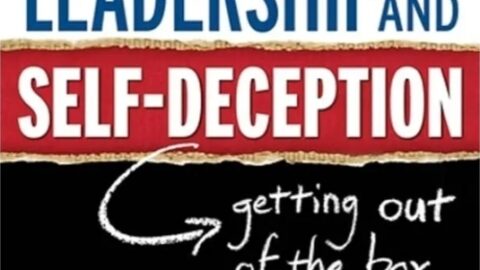Voltaire once warned, “Those who can make you believe absurdities can make you commit atrocities.” This insight has echoed throughout history, as authoritarian regimes repeatedly co-opt religious and educational systems to manufacture obedience, suppress dissent, and commit atrocities under a veil of moral legitimacy. Today, we find ourselves grappling with the same mechanisms: a public taught to obey, to conform, and to revere authority—not to think. Understanding how this obedience is cultivated, especially through religious legalism and institutional education, is essential to resisting the slow erosion of freedom and truth.
The Pattern That Repeats
History offers a recurring script: a leader rises amidst crisis, promising strength, purity, and order. People follow. Institutions grow silent. Dissent is criminalized. And behind the curtain, a religious or moral authority blesses the movement. Whether it’s a priest, a pastor, or a teacher, the language is the same: obey, follow, trust the leader.
This isn’t limited to one region or faith. Russia’s Orthodox Church props up Putin. Hindu nationalism fuels Modi’s political machine in India. Evangelical Christianity became the backbone of Trump’s base in the U.S. Religion offers authoritarians something no army can: moral authority. It justifies obedience, declares dissent sinful, and turns political agendas into sacred duties.
Kohlberg’s Stage 4: Legalism as Moral Blindness
Lawrence Kohlberg’s Theory of Moral Development identifies Stage 4 as the “Law and Order” phase, where morality is equated with obeying authority and following rules. In religious contexts, this becomes legalism—rigid, rule-based faith that prioritizes order over justice, conformity over conscience.
In Stage 4, people are taught that questioning authority is rebellion. They obey laws not because they are just, but because they are laws. Morality becomes obedience. This is dangerous.
Authoritarians exploit Stage 4 by presenting their regimes as lawful and divinely sanctioned. Romans 13 is often weaponized to silence dissent: “Let every soul be subject unto the higher powers.” But this legalistic interpretation ignores the context of justice and conscience found in higher moral stages (Kohlberg’s Stage 5 and 6), where law must serve human dignity and universal ethical principles.
The Educational System: Religion by Another Name
Today, formal education often serves the same function religion did in previous generations: it indoctrinates rather than enlightens. From an early age, children are rewarded for obedience and punished for questioning. They are trained to absorb, not inquire; to conform, not innovate; to meet standards, not seek truth.
This system mirrors religious legalism. Teachers become priests of conformity, textbooks sacred texts of state-approved narratives, and standardized tests instruments of obedience. The result is a population trained to equate morality with following instructions—a Stage 4 society incapable of confronting tyranny.
Obedience as a Virtue: The Machinery of Control
Both authoritarianism and religious legalism teach that obedience is the highest virtue. Leaders, like gods, demand faith. Rules are immutable. Suffering has divine purpose. Loyalty is sacred. Questioning is rebellion.
This mentality produces a populace that doesn’t just accept control but defends it. They don’t merely comply with injustice; they rationalize it. They will defend censorship in the name of tradition, endorse surveillance in the name of morality, and cheer punishment in the name of law.
This is how atrocities are committed—not by monsters, but by well-trained citizens who believe they are doing good.
The Religious-Political Merger
Authoritarians understand the power of belief. They quote scripture, attend religious events, and invoke divine language not because they are devout, but because it shields them from criticism.
Once politics is framed as sacred, debate becomes blasphemy. The leader becomes the shepherd, the people his flock, and laws become divine decrees. As Voltaire said, those who believe absurdities (“This leader is God’s chosen,” “Obedience is righteousness”) become capable of atrocities (detaining dissidents, banning speech, persecuting outsiders).
Education and Religion as Gateways to Authoritarian Thought
Both religion and education, when corrupted, train citizens to accept hierarchy, fear difference, and submit to authority. Children taught that truth comes from authority, not inquiry, become adults easy to manipulate.
This moral outsourcing—“God says it,” “The teacher says it,” “The state requires it”—removes responsibility from the individual. It breeds legalistic minds: capable of technical execution but void of ethical discernment.
Resistance: Climbing Beyond Stage 4
Kohlberg’s higher stages (5 and 6) offer the antidote. Stage 5 emphasizes social contracts and justice: laws must serve people, not control them. Stage 6 is universal ethics: conscience, not conformity, determines right and wrong.
True faith and true education both elevate us beyond obedience. Christ overturned religious legalism in his day, challenging Pharisees who tithed but ignored justice. Socrates questioned the gods of Athens. MLK disobeyed laws to uphold higher laws of justice. Gandhi saw through colonial religion to embrace moral truth.
The Cultural Reform We Need
We don’t need to destroy religion. We need to rescue it from political bondage. We don’t need to erase education. We need to restore its purpose: to teach people how to think, not what to think.
We need:
- Education that fosters inquiry over indoctrination.
- Faith that promotes conscience over conformity.
- Citizens trained in skepticism, empathy, and courage.
- Communities that value truth more than tradition.
- Laws that derive from justice, not ritual.
Final Warning and Hope
Authoritarianism doesn’t begin with violence. It begins with moral surrender. With silent pulpits. With classrooms that punish questioning. With prayers for power. With laws in sacred language.
The danger is not religion. The danger is religion as control. The danger is Stage 4 legalism in both church and school. The danger is a society where obedience is sacred and doubt is sin.
But there is hope.
If we teach people to think critically, to climb moral stages, to value conscience over command, we can resist.
Voltaire warned us. Kohlberg showed us the way. Now it is up to us to protect the fragile light of reason, justice, and liberty—before the absurdities we believe become the atrocities we commit.







